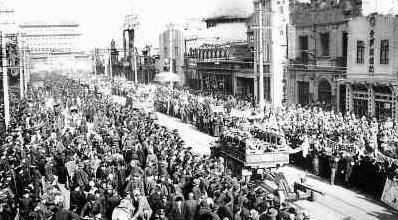
There are various reasons for the successful peaceful liberation of Peiping, but all of this began with the uprising of the Military Unification of Beiping War. It was Liu Ren who commanded and instigated the uprising at the Beiping Station of the military command.
"Send a man, develop a man, and plant a time bomb in the heart of the enemy." This is a sentence that Marshal Nie Rongzhen said when evaluating Comrade Liu Ren's achievements in commanding the city's underground work. Lao Cao, an underground traffic officer, is a "time bomb" sent by Comrade Liu Ren to ambush the enemy's heartland.
In 1944, at the end of the War of Resistance Against Japan, Lao Cao was ordered to enter the city of Beijing and lurk in anonymity. He made a career selling sheep's head meat, and lived for a long time in the Tujing Hutong No. 5 Courtyard in the area of Jinyuchi, a slum area in Beijing City, until August 1948, when Comrade Cao Cao never received instructions from his superiors to let him carry out his work.
In the war years, as a soldier, you can only stay among ordinary people, living the lowest life in Beiping City, or four years of "peace and stability", which is also a test. But Lao Cao was able to endure this kind of hard and uneventful life.
Lao Cao was originally from Cangxian County, from a poor family, and later after graduating from Baoding Normal School, he got a job as a primary school teacher, if it were not for the Japanese invasion, Lao Cao would live so peacefully, but the Japanese invasion made Lao Cao no longer calm, he joined the Eighth Route Army, after the establishment of the City Work Department in the Jin-Cha-Ji Border Region, because Lao Cao was an intellectual, he was sent to work in the urban work department.
Lao Cao does not show the mountains and does not show the water, is diligent and earnest, works hard and complains, and is fruitful. Therefore, sending Lao Cao to work in Beiping, Liu Ren was very confident.
In August 1948, Lao Cao finally received his task.
There is a small cigarette stand outside the north gate of Xidan Mall, which is an underground intelligence stronghold. Every other day, Lao Cao had to go to this small tobacco stall to buy a pack of "Red Shi" brand cigarettes, and for four years, cigarettes were cigarettes, and Lao Cao did not get any instructions from inside. On this day, as usual, he went to the small tobacco stall to buy cigarettes, but the comrade who sold cigarettes, when he handed the cigarettes to him, slapped the cigarettes hard, and quickly passed him a message with his eyes, Lao Cao immediately realized that this time was different from the past, this is a pack of cigarettes that is not ordinary, and sure enough, when he returned home to open the cigarettes, he found the instructions of his superiors:
Fire speed and 608 spy joint, code is as follows...
Lao Cao was very happy, and after four years, he finally received the task. In the evening, I finally connected with no. 608. Intelligence was also received (the intelligence was that the Beiping agents had mastered the list of more than 200 underground party and student movement backbones through various means, and it was scheduled to be published on August 19, and a large-scale search and arrest would be conducted in the city. )
He received the note no. 608 passed to him, went home to examine it carefully, and found that one of the old coins had a mezzanine, and according to the discipline of the underground work, he certainly could not open the information without authorization, and the paper money with the mezzanine suddenly appeared heavy in his hand. He didn't know the content of the intelligence, but he knew that it was related to the interests of the organization and the success or failure of the cause. So I immediately set off to deliver the paper money with the sandwich to the tobacco stall at the joint.
Liu Ren, who received the information, immediately made arrangements, and by the time the enemy announced the blacklist on August 19, most of the comrades had already been out of danger.
Lao Cao activated it, and it was no longer hidden, and on October 608, a more important piece of information was transmitted.
Chiang Kai-shek personally flew to Beiping, and on the one hand he ordered Fu Zuoyi, commander-in-chief of the North China Bandits, to send troops to reinforce Jinzhou; on the other hand, he personally planned an extraordinarily large plot. In order to save the situation, Chiang Kai-shek plotted to gather the strength of an army, a cavalry division, and a cavalry brigade, in a vain attempt to sneak into the western Baipo of Pingshan, the seat of the Party Central Committee. If Chiang Kai-shek's plot succeeds, the consequences will be unimaginable.
After receiving the information, the Party Central Committee quickly made strategic arrangements and smashed Chiang Kai-shek's conspiracy in one fell swoop.
Lao Cao knew a small person, but in the process of the peaceful liberation of Peiping, he was a big person, and it was precisely because of their group of small people that they did big things one after another, even if they were small people, they were also big people, without them there would be no new China today. Nor can we forget the thousands of such little people.